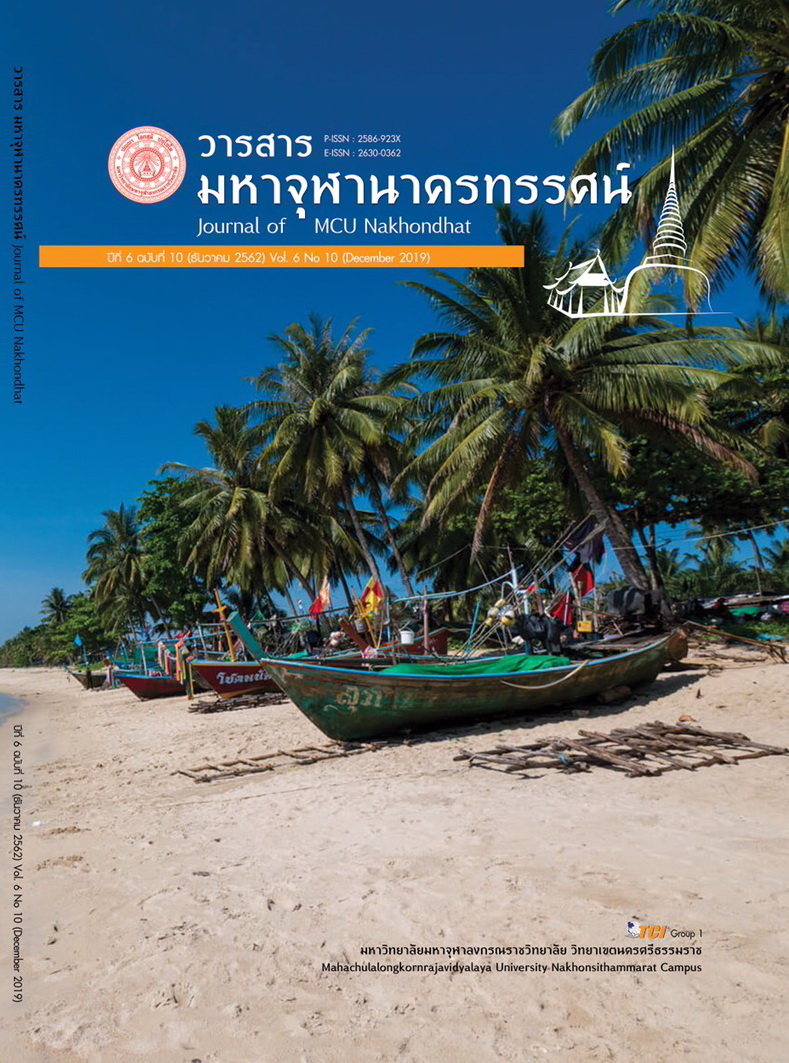THE PROCESS OF CORRUPTION IN BUDDHIST CIRCLES
Main Article Content
Abstract
This research Its objectives are 1) to study the causes of corruption in Buddhist circles, 2) to study the process of corruption procedures in Buddhist circles. From the problem of crisis in faith of the monks continuously increasing, there is using the statements which is not consistent with reality. It became a dispute between the state and religion and a matter of debate and cannot be concluded together until it became a problem throughout the country regarding the administration of monasteries, religious monuments, as well as various types of benefits which is growing from the property of the temple, including an enormous amount of land. The property of these temples is considered a religious property of the temple that must be managed in accordance with the procedures prescribed in the Ministerial Regulation No. 2 B.E. 2511 issued under the Sangha Act B.E. 2505, section 40. But the issue of benefits related to the temple's treasures, especially the enormous amount of donations that the temple has received from people who have donated their faith, there are many mistakes. Financial management and accounting is not transparent which causes corruption causing the temple to leak a lot of information. Providers include 1) The unit of government sector consists of administrators of the National Buddhism Office, executives of Dharma Sanam Luang division, executives of Pali Sanam Luang division, administrators of Phrapariyattidharma Dharma-Pali school in Bangkok area, administrators of Phrapariyattidharma school, department of general education, group 1 and group 10, consisting of 30 people, 2) the public and private sector consists of reporters, community leaders, village philosophers Including people involved within Phrapariyattidharma school, department of general education, group 1 and group 10, amount 15 people, 3) Academic staffs, lecturers and administrators of the Buddhist university, amount 5 people. This research uses in-depth interview individually.
The results of the research found that:
1) The cause of corruption in Buddhist circles is found that it is patronage system and benefits that creates the motivation for corruption is economic needs, favorable position and opportunity, 2) The process of corruption in Buddhist circles is found to be caused by the lack of practice in the relevant regulations of work control systems, the lack of deficiencies in the preparation of various accounts and registrations, the financial audit deficiencies. And most temples do not yet have a financial management structure of the temple systematically related agencies, especially the National Buddhism Office should be determined to have measurable preparation of financial reports annually, and brought to the Provincial Buddhism Office as a collector with regular audits by a certified auditor which may be conducted in a random manner in the initial stages, and increasing the level of inspection up to the routine inspection of all the temples as well as preparing financial reports for the temple systematically to be able to use the information at a national level.
Article Details
References
กฤติน จันทร์สนธิมา. (2561). การศึกษาการมีส่วนร่วมในการบริหารจัดการศาสนสมบัติโดยใช้แนวทางประชารัฐ. กรุงเทพมหานคร: สถาบันพระปกเกล้า.
กอง บก. หนังสือพิมพ์ข่าวสด. (2561). หนังสือพิมพ์ข่าวสด: (25 พฤษภาคม 2561). เรียกใช้เมื่อ 31 มกราคม 2562 จาก https://www.mebmarket.com/index.php? action=BookDetails&book_id=75299
คณะกรรมาธิการวิสามัญพิจารณาศึกษาการแก้ไขปัญหาระบบอุปถัมภ์ในระบบราชการไทยให้เป็นรูปธรรม. (2559). การแก้ไขปัญหาระบบอุปถัมภ์ในระบบราชการไทยให้เป็นรูปธรรม. กรุงเทพมหานคร: สภานิติบัญญัติแห่งชาติ.
ณดา จันทร์สม. (2555). รายงานวิจัยการบริหารการเงินของวัดในประเทศไทย. กรุงเทพมหานคร: สถาบันบัณฑิตพัฒนาบริหารศาสตร์.
ธวัชชัย สีสุวรรณ. (2540). พฤติกรรมการทุจริตเงินงบประมาณแผ่นดิน: ศึกษากรณีองค์การบริหารส่วนจังหวัดขอนแก่น. ใน ภาคนิพนธ์หลักสูตรพัฒนบริหารศาสตร์มหาบัณฑิต สาขาพัฒนาสังคม. สถาบันบัณฑิตบริหารศาสตร์.
พระธรรมปิฎก (ป.อ. ปยุตฺโต). (2556). ความสำคัญของพระพุทธศาสนาในฐานะศาสนาประจำชาติ (พิมพ์ครั้งที่ 19). กรุงเทพมหานคร: สำนักพิมพ์ธรรมสภาและสถาบันบันลือธรรม.
ราชกิจจานุเบกษา. (2511). กฎกระทรวง.ฉบับที่ 2 85,98 ก (29 ตุลาคม 2511).
______. (2550). รัฐธรรมนูญแห่งราชอาณาจักรไทย 124,47 ก หน้า 23 (24 สิงหาคม 2550).
______. (2560). รัฐธรรมนูญแห่งราชอาณาจักรไทย 134, 40 ก หน้า 17 (6 เมษายน 2560).
หนังสือพิมพ์ทรรศนะ. (2561). หนังสือพิมพ์ธรรมนำโลก : (1-31 พฤษภาคม 2561). เรียกใช้เมื่อ 31 มกราคม 2562 จาก http://www.tssnnews.com/tssnnews/2018/05/31
หนังสือพิมพ์ไทยรัฐ. (2561). สรุปข่าวเด่นรอบวันประจำวันที่ 15 มิ.ย. 61. เรียกใช้เมื่อ 31 มกราคม 2562 จาก https://www.thairath.co.th/news/local/bangkok /1308987

